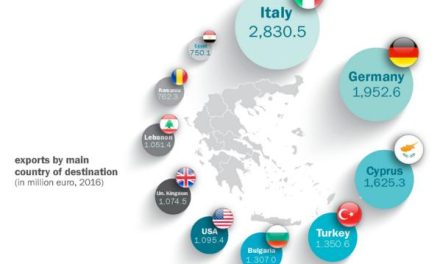The Greek Politics Specialist Group (GPSG) is an international, non-profit network of leading experts on Greek politics under the umbrella of the UK’s Political Studies Association (PSA). The GPSG is one the most active international networks for the study of Greek politics: its wide range of activities and publications aim at providing a understanding of modern Greece to an international audience; creating an academic forum for debate and analysis; acting as source for journalists and international news organizations and creating a valuable interface between Greek and international academia.
GPSG just launched a new website, https://gpsg.org.uk where you stay informed on their papers and conferences, read their annual reports, newsletters and special issues. as well as listen to their podcasts. More than 110 of conference papers are available and can be accessed in the website’s PSA Conference Panels section.
The most recently paper published in GPSG is on “Mapping the far-right vote in the European electoral arena: The Greek far-right in cross-national perspective” by Evgenia-Eleni Mavropoulou, and it has won the GPSG award under the “Call for Paper Competition Greece: From Economic Rescue to Recovery and Reform?”.This working paper is concerned with the electoral performance of far-right parties in the 2014 European Parliamentary elections. The author concludes the onset of the financial crisis did not exclusively provoke but contributed to the further political consolidation and electoral reinforcement of the far-right party spectrum, stating thtn even in the case of Greece, the far-right phenomenon of Golden Dawn “should be assessed as a deep-rooted and not a circumstantial aspect of the contemporary party systems since over the last four decades it has been presenting a continuity and an apparent flexibility along every single electoral process.”
The Greek Politics Specialist Group goals as stated in their website are:
- To promote the understanding of Greek government and politics via the encouragement of systematic research and teaching.
- To strengthen the ties between the UK and Greek academic communities and facilitate the exchange of research and expertise between the two countries.
- To support comparative and interdisciplinary political analysis, by collaborating with other PSA Specialist Groups and academic research centres, and by highlighting an expanding body of work on public administration, international affairs, psephology, political communication, political marketing, political theory etc.
- To provide UK-based scholars of (and from) Greece with a much-needed forum for the free exchange of ideas and to facilitate networking within the academic community.
On October 29, 2018, at the Onassis Cultural Centre in Athens the event titled “Diaspora and political participation in Greek political affairs”, was co-organized by the Greek Diaspora Project of SEESOX (South East European Studies at Oxford), the Greek Politics Specialist Group and the diaΝΕΟsis research organization, takling the pressing issue of voting rights for expatriate Greek citizens from their place of residence, as well as the general political behavior of Diaspora Greeks (recent and past). The expert committee’s conclusion on whether and how Greeks abroad can vote from their place of residence is expected by the end of January 2019.
The latest book published by members of the Greek Politics Specialist Group is “Crisis in the Eurozone Periphery: the Political Economies of Greece, Portugal, Spain and Ireland” (London: Palgrave 2018). The book, edited by Owen Parker and Dimitris Tsarouhas, investigates the causes and consequences of crisis in four countries of the Eurozone periphery – Greece, Spain, Portugal and Ireland. The contributions to this volume are provided from country-specific experts, and are organized into two themed subsections: the first analyses the economic dynamics at play in relation to each state, whilst the second considers their respective political situations. The work debates what made these states particularly susceptible to crisis, the response to the crisis and its resultant effects, as well as the manifestation of resistance to austerity. In doing so, Parker and Tsarouhas consider the implications of continued fragilities in the Eurozone both for these countries and for European integration more generally.
GPSG’s executive committee is composed of Dr Georgios Karyotis, Senior Lecturer and PGT Director in the School of Social and Political Sciences at the University of Glasgow; Dr. Stella Ladi, Senior Lecturer at Queen Mary University of London and assistant professor at Panteion University in Athens, Dimitris Tsarouhas, Associate Professor at the Department of International Relations, Bilkent University, Turke; Dr. Vasiliki Tsagkroni, Lecturer at Leiden University at the Institute of Political Science; Dr Dimitris Skleparis, Research Associate at the University of Glasgow, Dr. Lamprini Rori, Lecturer in Politics at the University of Exeter and Dr Panagiota Manoli, Assistant Professor in International Political Economy at the Department of Mediterranean Studies, University of the Aegean.
Read more via Greek News Agenda: SEESOX Diaspora: New research project and website on Greek Diaspora; Kevin Featherstone on LSE’s Hellenic Observatory and the concept of ‘union’ in the EU; Thanos Veremis on the FYROM name issue, European Policy for the Balkans and Greece’s future
I.L.
TAGS: THINK TANKS














